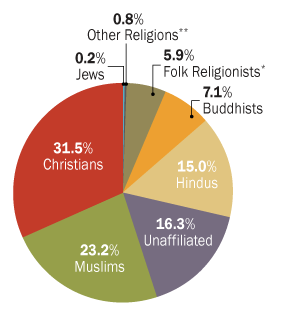I’ve had a quick swipe at pacifism so I’d like to discuss it more. I think the concept of pacifism (including pacifist religion) is harmful. Let’s quickly look at 2 pacifist religions:
Jainism

A minority religion in India (4.2 million) followers. They believe in the sacredness of all life. Jains are vegetarian, often wear a cloth over their mouth (to avoid inhaling insects) and sweep the path in front of themselves (to avoid stepping on insects). Sam Harris makes a great point — no matter what, there will never be any Jain suicide bombers. From that perspective it’s a definite plus. But not all’s peachy.
The highest calling for a Jain is to starve him/herself to death. It’s a special religious act called Santhara. It’s not done frequently nor taken lightly. Still, it’s no coincidence that a pacifist religion would be ok with violence to oneself. Much like VHEMT who advocate voluntary extinction of humans for the sake of “Mother Earth”, Jainism’s ultimate goal is to do no violence to a plant. There are 25+ types of fasts in Jainism: it’s literally an obsession. Even without suicidal tendencies, pacifism is a straitjacket. If you’re worried about swallowing insects you’re not free to act. You can never achieve much — doing anything remarkable always requires you to at times forget about the 600,000 species of beetle you might step on.
Quakers

Quakers are the pacifist wing of Christian denominations. They’re probably the least dogmatic of pre-20th-century denominations, not believing the Bible to be the complete inerrant word of God (quite a mean feat in the 17thC when they originated). Quakers have been closely associated with the women’s rights, civil rights and anti-slavery movements.
All great but still, dogmatic pacifism has disadvantages. Quakers obviously didn’t fight in the US War of Independence. If the US lost, it’s hard to say for sure if the world would be worse off (now or then). But there are reasons to believe it would have been terrible. Since the American revolution helped propel democracy, people would have been stuck under despots for longer if the US lost.
From Goodbye to All That: (A pacifist during WWI responding to the chairman of the military tribunal’s question: what would you do if you saw a German soldier trying to violate your sister?) I would try to get between them. This is not true for most people. Quaker views are less extreme than Jainism but they can lead to just as much harm. They suppress the natural instinct most people have to fight for their loved ones if need be.
So What’s Wrong With Pacifism?
- Pacifist 1: “it would be great if everyone practiced it”. As pointed out by the Reason Driven Podcast even if everyone practiced Rush-Lumbaughism (I add Osamaism & Ann-Coulterism) the world would be great. There’d be no disagreement. So you don’t need pacifism: almost any value system would be good if universal. The whole problem is that the world is so full of disagreements.
- Pacifist 2: “pacifism is an effective principle of dealing with those who disagree”. It worked a few times but not in the general case. As long as there are people who are unpacifist AND won’t shirk from massacring pacifists (and there’s plenty of such people), the strategy loses. For pacifism to work already requires a level of enlightenment in society: how good would an American Indian pacifist resistance have been against the West?
- Pacifist 3: “the act of killing a human being is so morally wrong [says Jesus/Krishna/The Benevolent Leader] that even if this human being will massacre thousands, you still have no right to do it”. Not wanting to swear too much, I leave the refutation as an exercise for the reader.





0 Comments